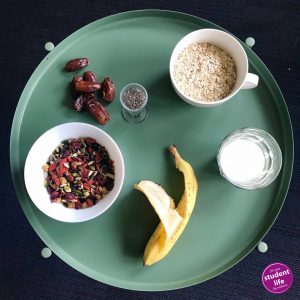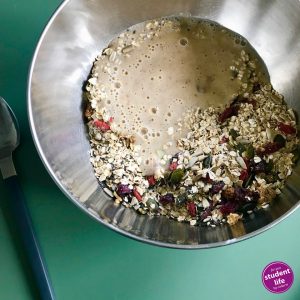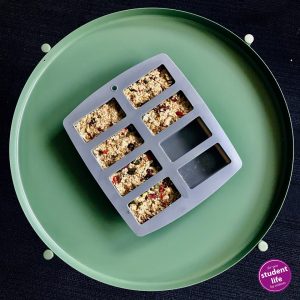FUEL- Spending hours & hours inside the studio being involved in artistic physical work requires the right fuel for optimal performance and joy! For the moving body, carbohydrates are the best and fastest source of energy. So: Meet & grEAT the ‘Ballet Barre’! Besides a good dose of energy, this bar also contains essential antioxidants. Making this the perfect bar to refuel and re-energize body and mind!



RECIPE BALLET BAR(RE)
Recipe for: 6 bars = 6 in between snacks
Duration: 15 min. + 15 min. oven
Purpose: a compact energy bar packed with nutrients
Equipment: baking tray (for energybars) or cake tin and baking paper
INGREDIENTS
- 50 grams pitted dates (5 á 7 pieces)
- 100 ml (rice/oats/soy) milk
- 75 grams banana (± half medium sized banana)
- 100 grams of a cranberry, mulberry, goji berry, pumpklin- and sunflower seeds mix
- 15 grams of chia seeds
- 100 grams of rolled oats/oatmeal
- Pinch of LoSalt/mineral salt
- Optional: pinch of cinnamon, cardamom or ginger powder
METHOD of PREPARATION
- Preheat the oven at 175 degrees.
- Mash the dates with the banana and milk. Pour this puree in a bigger bowl. Combine the mix of fruits and seeds, chia seeds, oatmeal and LoSalt together with the date puree. Divide the mixture into six bars, or press the mixture in a cake form until you have a ± 2.5 to 3 cm thick bar.
- Place in the oven for 10 to 15 minutes. Take out of the oven (and cut into six bars). Place them on a baking paper and bake the bars for another 5 minutes in the oven until they are golden brown and crisp on the outside. Inside they should still be slightly soft. You can store your energy bars for up to 5 days in a covered container in the refrigerator. But, most likely they won’t last that long… :)
Nutritional values per Bar(re)
Kcal: 189 | Fat: 5.8g (saturated fat 0.8 g) | Protein 5.7g | Carbohydrates 40g | Fiber 4g
MORE INFO ABOUT CARBOHYDRATES
Together with fats carbohydrates deliver all the energy we humans need. The body gets its energy for all daily activities for 50% from carbohydrates. But for someone who’s a fanatic sportsperson or dancer this can add up to 90%. A different name for carbohydrates is sugars. The body ‘cuts’ complex carbohydrates into smaller sugars and breaks those down glucose, fructose and galactose (simple sugars). These simple sugars are then absorbed into the blood. Serving as a major fuel source for all our cells.
Sugars are bad, aren’t they?
No, sugars are not bad. Too much sugars are bad. But that counts for all nutrients and foods: too much of one thing is never good. Nowadays it seems as if we are afraid of carbohydrates. Sugars are often placed in a negative light. But for our brain sugar (glucose) is the number one source of fuel! If we want our brain to function properly we need sugars regularly and daily. Also, muscle fibers of fanatic active people such as athletes cannot work optimal without a regular dose of carbohydrates during exercise. Of course it’s always best to choose unrefined and natural sugars, such as the sugars found in (whole wheat) grains, (brown) rice, fruits and even vegetables. Better to stay away from the fast and added refined sugars found in cookies, candy, soft drinks, energy drinks etc. You can even find added sugar in meat, fast food, preserves and tea (!).
FUN FACTS
CHIA SEED: Chia seeds come from the Mexican mint plant Chia. The flowers of this plant produce these small seeds that can take up to nine times their own weight in moisture. Chia seeds contain quite a lot of protein, but these proteins can only be absorbed by the body when one chews the seeds well.
GOJI BERRIES: Goji berries grow on the boxing thorn or red medlar bush. They are brightly coloured orange-red berries of 1.5 to 2 cm long, and the berries can be eaten both raw, dried or cooked and are rich in vitamins, minerals, amino acids and antioxidants.
ANTIOXIDANTS: Antioxidants are compounds that inhibit oxidation. Oxidation is a chemical reaction that can produce free radicals, thereby leading to chain reactions that may damage the cells of organisms. The human body produces antioxidants by itself as well. In addition, a good basic nutrition contains an additional dose of antioxidants. When being involved in intensive sports an athlete can benefit from antioxidants. But: free radicals can also have a positive impact, namely by improving the aerobic metabolism and increasing muscle strength due to training. When you take in too many antioxidants the positive effect that free radicals can have is diminished.
Tip: Try avoid a random intake of food supplements, pills or powders that don’t specifically contain what you might need. By making sure you enjoy a varied diet and choose nutrient rich foods your nutrition will contain all those little essential nutrients, including antioxidants (such as vitamin E, C, selenium and bioactive substances).

